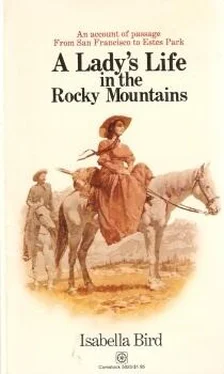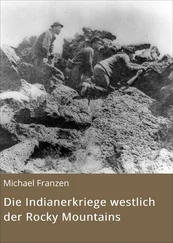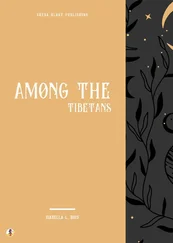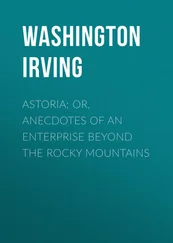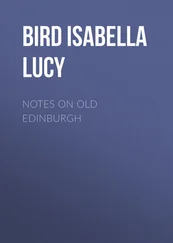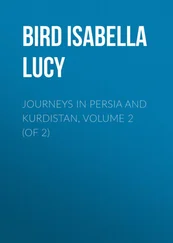Not a quarter of an hour after I had wondered how long I could hold on I saw, to my surprise, close to me, half-smothered in snow, the scattered houses and blessed lights of Longmount, and welcome, indeed, its wide, dreary, lifeless, soundless road looked! When I reached the hotel I was so benumbed that I could not get off, and the worthy host lifted me off and carried me in.
Not expecting any travelers, they had no fire except in the bar-room, so they took me to the stove in their own room, gave me a hot drink and plenty of blankets and in half an hour I was all right and ready for a ferocious meal. "If there's a traveler on the prairie to-night, God help him!" the host had said to his wife just before I came in.
I found Evans there, storm stayed, and that — to his great credit at the time — my money matters were all right. After the sound and refreshing sleep which one gets in this splendid climate, I was ready for an early start, but, warned by yesterday's experience, waited till twelve to be sure of the weather. The air was intensely clear, and the mercury seventeen degrees below zero ! The snow sparkled and snapped under one's feet. It was gloriously beautiful! In this climate, if you only go out for a short time you do not feel cold even without a hat, or any additional wrappings. I bought a cardigan for myself, however, and some thick socks, got some stout snow-shoes for Birdie's hind feet, had a pleasant talk with some English friends, did some commissions for the men in the park, and hung about waiting for a freight train to break the track, but eventually, inspirited by the good news from you, left Longmount alone, and for the last time. I little thought that miserable, broiling day on which I arrived at it with Dr. and Mrs. Hughes, of the glories of which it was the gate, and of the "good times" I should have. Now I am at home in it; every one in it and along the St. Vrain Canyon addresses me in a friendly way by name; and the newspapers, with their intolerable personality, have made me and my riding exploits so notorious, that travelers speak courteously to me when they meet me on the prairie, doubtless wishing to see what sort of monster I am! I have met nothing but civility, both of manner and speech, except that distraught pistol shot. It looked icily beautiful, the snow so pure and the sky such a bright, sharp blue! The snow was so deep and level that after a few miles I left the track, and steering for Storm Peak, rode sixteen miles over the pathless prairie without seeing man, bird, or beast — a solitude awful even in the bright sunshine. The cold, always great, became piteous. I increased the frostbite of yesterday by exposing my hand in mending the stirrup; and when the sun sank in indescribable beauty behind the mountains, and color rioted in the sky, I got off and walked the last four miles, and stole in here in the colored twilight without any one seeing me.
The life of which I wrote before is scarcely less severe, though lightened by a hope of change, and this weather brings out some special severities. The stove has to be in the living-room, the children cannot go out, and, good and delightful as they are, it is hard for them to be shut up all day with four adults. It is more of a trouble than you would think for a lady in precarious health that before each meal, eggs, butter, milk, preserves, and pickles have to be unfrozen. Unless they are kept on the stove, there is no part of the room in which they do not freeze. It is uninteresting down here in the Foot Hills. I long for the rushing winds, the piled-up peaks, the great pines, the wild night noises, the poetry and the prose of the free, jolly life of my unrivalled eyrie. I can hardly realize that the river which lies ice bound outside this house is the same which flashes through Estes Park, and which I saw snow born on Long's Peak.
ESTES PARK, December 7 .
Yesterday morning the mercury had disappeared, so it was 20 degrees below zero at least. I lay awake from cold all night, but such is the wonderful effect of the climate, that when I got up at half-past five to waken the household for my early start, I felt quite refreshed. We breakfasted on buffalo beef, and I left at eight to ride forty-five miles before night, Dr. Hughes and a gentleman who was staying there convoying me the first fifteen miles. I did like that ride, racing with the other riders, careering through the intoxicating air in that indescribable sunshine, the powdery snow spurned from the horses' feet like dust! I was soon warm. We stopped at a trapper's ranch to feed, and the old trapper amused me by seeming to think Estes Park almost inaccessible in winter. The distance was greater than I had been told, and he said that I could not get there before eleven at night, and not at all if there was much drift. I wanted the gentlemen to go on with me as far as the Devil's Gate, but they could not because their horses were tired; and when the trapper heard that he exclaimed, indignantly, "What! that woman going into the mountains alone? She'll lose the track or be froze to death!" But when I told him I had ridden the trail in the storm of Tuesday, and had ridden over 600 miles alone in the mountains, he treated me with great respect as a fellow mountaineer, and gave me some matches, saying, "You'll have to camp out anyhow; you'd better make a fire than be froze to death." The idea of my spending the night in the forest alone, by a fire, struck me as most grotesque.
We did not start again till one, and the two gentlemen rode the first two miles with me. On that track, the Little Thompson, there a full stream, has to be crossed eighteen times, and they had been hauling wood across it, breaking it, and it had broken and refrozen several times, making thick and thin places — indeed, there were crossings which even I thought bad, where the ice let us through, and it was hard for the horses to struggle upon it again; and one of the gentlemen who, though a most accomplished man, was not a horseman, was once or twice in the ludicrous position of hesitating on the bank with an anxious face, not daring to spur his horse upon the ice. After they left me I had eight more crossings, and then a ride of six miles, before I reached the old trail; but though there were several drifts up to the saddle, and no one had broken a track, Birdie showed such a pluck, that instead of spending the night by a camp-fire, or not getting in till midnight, I reached Mr. Nugent's cabin, four miles from Estes Park, only an hour after dark, very cold, and with the pony so tired that she could hardly put one foot before another. Indeed, I walked the last three miles. I saw light through the chinks but, hearing an earnest conversation within, was just about to withdraw, when "Ring" barked, and on his master coming to the door I found that the solitary man was talking to his dog. He was looking out for me, and had some coffee ready, and a large fire, which were very pleasant; and I was very glad to get the latest news from the park. He said that Evans told him that it would be most difficult for any one of them to take me down to the Plains, but that he would go, which is a great relief. According to the Scotch proverb, "Better a finger off than aye wagging," and as I cannot live here (for you would not like the life or climate), the sooner I leave the better.
The solitary ride to Evans's was very eerie. It was very dark, and the noises were unintelligible. Young Lyman rushed out to take my horse, and the light and warmth within were delightful, but there was a stiffness about the new régime . Evans, though steeped in difficulties, was as hearty and generous as ever; but Edwards, who had assumed the management, is prudent, if not parsimonious, thinks we wasted the supplies recklessly, and the limitations as to milk, etc., are painfully apparent. A young ex-Guardsman has come up with Evans, of whom the sanguine creature forms great expectations, to be disappointed doubtless. In the afternoon of yesterday a gentleman came who I thought was another stranger, strikingly handsome, well dressed, and barely forty, with sixteen shining gold curls falling down his collar; he walked in, and it was only after a careful second look that I recognized in our visitor the redoubtable "desperado." Evans courteously pressed him to stay and dine with us, and not only did he show the most singular conversational dexterity in talking with the stranger, who was a very well-informed man, and had seen a great deal of the world, but, though he lives and eats like a savage, his manners and way of eating were as refined as possible. I notice that Evans is never quite himself or perfectly comfortable when he is there; and on the part of the other there is a sort of stiffly-assumed cordiality, significant, I fear of lurking hatred on both sides. I was in the kitchen after dinner making rolled puddings, young Lyman was eating up the relics as usual, "Jim" was singing one of Moore's melodies, the others being in the living-room, when Mr. Kavan and Mr. Buchan came from "up the creek" to wish me good-bye. They said it was not half so much like home now, and recalled the "good time" we had had for three weeks. Lyman having lost the ow, we have no milk. No one makes bread; they dry the venison into chips, and getting the meals at all seems a work of toil and difficulty, instead of the pleasure it used to be to us. Evans, since tea, has told me all his troubles and worries. He is a kind, generous, whole-hearted, unsuspicious man, a worse enemy to himself, I believe, than to any other; but I feel sadly that the future of a man who has not stronger principles than he has must be at the best very insecure.
Читать дальше
